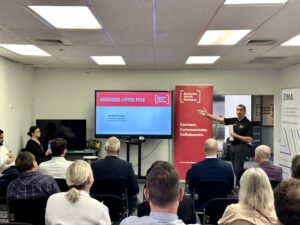Business Lunch Series
VOTE 2020: Pre-election luncheon | 1st October
North Harbour Stadium
Business North Harbour’s (BNH’s) event was a memorable snapshot of an election in unprecedented times. To comply with COVID-19 Alert Level 2 protocols, North Harbour Stadium’s main lounge was divided by a clear acrylic wall, with no more than 100 people on either side.
An audience of the area’s small business owners and their guests tucked into snapper or rack of lamb, while MC Mike McRoberts introduced representatives from the five main political parties (in order of a random draw) for their six-minute presentations:
- Chlöe Swarbrick, Green Party of Aotearoa New Zealand
- Rt Hon Winston Peters, New Zealand First
- Hon Phil Twyford, New Zealand Labour Party
- Hon Paul Goldsmith, New Zealand National Party
- David Seymour, ACT New Zealand
Ms Swarbrick spoke about the three crises facing the country right now: climate change, biodiversity, and deepening poverty, arguing that we cannot afford not to invest in a green economy. Tackling these issues (by providing, for example, warmer homes, an EV charging station network, and roadways that are more suitable for pedestrians and cyclists) would necessitate “large scale deployment and create jobs”. Paraphrasing Secretary for Education Iona Holsted, she said, “COVID-19 has exposed inequality, not created it” – and that, together, we can tackle the problems and must not stop until poverty is eliminated and nature thrives.
Perhaps surprisingly, since he was Deputy Prime Minister at the time, Mr Peters began by declaring that New Zealand was not doing well before COVID-19. NZ First had framed the country’s COVID response, he stated, following the lessons of Labour government history and “the 1935 approach” which helped to set up long term access to housing, employment and welfare, and provided some policy stability for the next 50 years. He vowed there would be no personal or business tax increases, that he would reduce corporate taxes, reintroduce 90-day work trials, and offer adjusted bank rates for orchards and vineyards.
“Jacinda Ardern has led a strong and stable government” said Mr Twyford. Despite having no playbook, the government had stepped up with a response that has been internationally recognised, he continued. Labour has a five-point plan for economic recovery: invest in people; invest in jobs (especially infrastructure); prepare for the future to “build back better”; support SMEs and entrepreneurs (especially digital enablement); pivot globally to adapt to these extraordinary times and challenges. Debt should be kept as low as possible, but he strongly believes that austerity should not be the path.
Likening Mr Peters’ presence to Elton John’s farewell tour – “this could be the last time you get to see him” – Mr Goldsmith was clearly in rambunctious mood. With unemployment predicted to potentially rise to 100,000 in two years, he disagreed with Mr Twyford’s approach, saying that jobs come from investment in the private sector rather than directly through the government (citing possum hunting and flax planting as “useful” but “not the whole story”). We are a country of exporters, he said, and can produce what the world wants at a good price, but there may not be a return to surplus for 15 years. National would give short-term tax cuts (effective 1 December) to stimulate the economy, because people not government should decide how to spend their money.
Coming from a family of electrical engineers, Mr Seymour grew up in a business household and understands that business financial troubles can “bleed into personal finances”. He strongly believes that New Zealand must get “Taiwan-smart” with its public health response to COVID-19, and take a pragmatic “risk weighted approach”, asking why, when it is coronavirus-free, is there no bubble with Samoa, for example. Keeping debt low, the country needs to seize on the opportunities of being an island nation in a global pandemic, and get the regulatory/tax environment right so that innovation and investment can “take off like a rocket”.
A Q&A session followed with Mike McRoberts asking the pre-submitted questions on attendees’ behalf, since roving microphones are deemed not appropriate at Alert Level 2. Time was limited, so answers were generally succinct – although not without some banter.
How would the candidates help SMEs who have not taken loans or other financial support during COVID-19?
David Seymour (DS) proposes reducing income tax permanently and GST temporarily (to 10 per cent). Paul Goldsmith (PG) gave the example of increased depreciation rates, enabling business owners to write off assets of up to $150,000. Phil Twyford (PT) said that the government had already “rolled out a raft” of assistance, including side-lining $10 million in batches of $2,500 to help businesses digitise. Winston Peters (WP) claimed that anyone who wants to reduce income tax does not understand the world, and referred back to his earlier comments about strategy. Chlöe Swarbrick (CS) wants bigger companies to match the standards set by smaller businesses (e.g., paying a fair wage, supporting local), a reinvigoration of “celebrating New Zealand made”, and is pushing for improved “country of origin” labelling.
Especially in light of recent events and ongoing disruption, what are candidates’ opinions of a second Waitematā Harbour crossing?
This question prompted a rare chorus of unity! Everyone recognised this as a priority, albeit with slightly different solutions (bridge or tunnel, road and/or rail) and timescales – as BNH board chairman Peter Lamberton later quipped, “It could start anywhere between the next three years and the time of my death!”
PG wants a project ready to go by 2028 (if not before) and to invest in an increased ferry service too. PT highlighted that half the people crossing the bridge currently do so by bus, and would like to see work begin on a tunnel by 2028 (maybe). WP wants to invest in heavy rail to carry freight, stating “We have to act like a first world country”. CS stressed the need for an effective mass transit system with one card for all modes of transport. She also countered PG and PT’s assertion that she hates cars – she actually travelled to/from the event by car-share – highlighting that the transit system would clear roads for people who need to drive themselves. DS referenced the original 1950s plan which included three crossings. The biggest barrier, he claims, is the regular battles concerning policy and financial backing. He proposes a 30-year partnership between local and central government so that, once set, a strategy cannot be undone after a general election.
What are you going to do to support the tech sector?
PT will continue to provide access to finance and skilled workers, and invest in infrastructure. WP agreed with Labour’s overall approach, along with taxation incentivisation. CS and DS shared the frustration of parliament being “utterly shocking at keeping up with technology”, recalling that, during a conversation about Uber, they had to explain who/what Lime was… Investing in tech has numerous advantages, not least to counter climate change, and CS would particularly like to support New Zealand’s world-class video game sector, which sometimes slips between the cracks of tech and arts and culture. DS believes that the current regulatory environment is hostile to technology, and that the immigration policy is a disaster. PG feels that Rocket Lab only happened in New Zealand “by accident” and remarked “whoever would’ve thought” that Xero would take off here. He said that people have to be allowed to act, and that all options have to be considered, including the controversial ones (such as natural gas exploration). That way, brilliant ideas can be enabled.
What would be your priorities for your first 100 days in government?
“It’s the economy, stupid”, said WP (quoting Bill Clinton in 1992), stating that the unity of our team of five million must continue. CS would focus on the “three Cs”: collaboration, communication and creativity, without replicating “the design bugs” of the past. DS had just one C: certainty, which is about safely reconnecting with the world. At its core, National’s plan would be about job creation, temporary tax cuts, and making it easier to employ the staff required. PT returned to his “build back better” pledge, stating that we can export our way out of this crisis, and arguing that putting money back into the hands of low income earners – who will spend it – is a more effective stimulus than tax cuts for the well-off.
The conversations and debates amongst attendees continued well after the final round of applause. It was clear that this had been a successful and valuable event, not only for the area’s business owners to experience first-hand the personalities behind the policies, but also for them to reconnect with each other.
Click here to see the event’s photos.
2020ACT New ZealandChloe SwarbrickDavid SeymourElectionGreen PartyLabour PartyLuncheonNational PartyNZ FirstPaul GoldsmithPhil TwifordPre-electionWinston Peters




